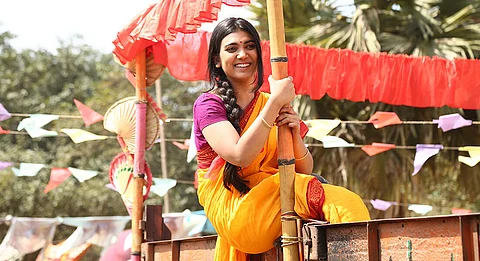
- In-Depth Stories
- Web Stories
- Reviews
- News
- FC Lists
- Interviews
- Features
- FC SpecialsFC Specials

Director: Abhishek Saha
Cast: Arjaa Banerjee, Sudipta Chakraborty, Jayanta Hore, Koushik Kar, Rajnandini Paul, Amartya Ray, Chitra Sen
Language: Bengali
Spoilers Ahead…
In One Man's Meal, E.B. White says, 'Everything in life is somewhere else, and you get there in a car.' Or, in the case of Uronchondi, in a truck…
The road movie as a genre came into its own in the Hollywood of the 1960s as baby boomers began hitting the roads. This was a generation driven by an angst, a cynicism, that made them leave their apparently settled lives in search of some meaning to the randomness of existence. Dennis Hopper's Easy Rider (1969) and Bob Rafelson's Five Easy Pieces (1970) defined the genre, which often incorporated elements from other genres like the love story (Two for the Road), the crime drama (Bonnie and Clyde) or the buddy movie (Midnight Run and Thelma and Louise).
Indian cinema, however, has largely steered clear of the road. Probably because we as a people have always had our many scriptural texts to show us the way; maybe because we have lacked the spirit of questioning and discovery; maybe we have always been fatalists. Even when Hindi films like Dil Hai Ke Maanta Nahin, Finding Fanny, Jab We Met, Highway have ostensibly evoked the tropes of the genre – characters taking to the road driven by circumstances and in the process finding answers that eluded them or finding themselves – we have seldom labelled them thus. Which is what makes Uronchondi a rare bird: a film that has been actively promoted as a road movie – indeed, as Bengali cinema's first-ever road movie.
For a change it is refreshing to see a film unfold against the countryside, with non-city folks as protagonists, speaking authentic local dialect
Meenu (Rajnandini Paul, making her debut) runs away from her wedding, dressed in her bridal finery, to go to her lover, who runs 'the biggest tailoring shop' in Situr village. With the groom's party giving chase, she hails a truck. In this day and age, that would be a foolhardy move for a woman to make, but thankfully, her fellow travellers Chotu (Amartya Ray in an impressive debut) and Bindi (Sudipta Chakraborty, in the performance of the film) turn out to be kindred souls. Embarking on the journey, they encounter myriad trials and tribulations, the police hot on their tail, a nagging old harridan (Chitra Sen) making her way from one son's house to another's because, she says, both of them want her to live with them – but of course you know the truth at the outset.
One of the essentials of a road movie is the development in the character graph of its protagonists in the course of the journey. On that score, Uronchondi does not quite deliver. There are no perceptible changes in the characters of, say, Chotu or Meenu. Even in the case of the old hag, you know exactly what's coming, and even though she underlines the 'freedom of the feminine spirit' in the film's last line, you don't quite get a sense of that coming through. But does that matter? Or should it? No – because on its own, Uronchondi is a well-made and well-intentioned film. It makes the right noises about gender equality and violence against women, and for the most part does so unobtrusively. Writer Sudeep Das comes up with some pungent dialogues that hit home – the world making a fool of women by describing them as 'ma', or a nice little observation about women being like clouds which ought to be allowed to float free.
There's a conviction, a simplicity at its core that you cannot help admire and applaud
Debutante director Abhishek Saha has his heart in the right place. For a change it is refreshing to see a film unfold against the countryside, with non-city folks as protagonists, speaking authentic local dialect. That – a rural setting – could well be first for a road movie, for almost all the examples cited above are urban in context. Soumik Haldar's camera captures rural Bengal in all its pristine glory (the film has been shot largely outdoors in and around Purulia) as the truck makes its way through vast expanses of fields on both sides, past the quintessential pond and the ranga matir path.
The film loses steam somewhere down the line, particularly after the entry of Bindi's abusive husband. An interminable pre-climactic chase segues into almost docu-feature territory with the viewer being given a tour of indigenous Bengal handicrafts (there's even a nod to Mamata Banerjee in the pre-credits acknowledgements) which serves as a moment of epiphany for Bindi on the road ahead for them. The climactic showdown, devoid of any surprise or even energy, is a letdown.
Despite these speed-breakers, Uronchondi is a journey worth making. There's a conviction, a simplicity at its core that you cannot help admire and applaud. Superstar Prosenjit Chatterjee deserves kudos for backing a film that dares to be this non-mainstream in content and approach.